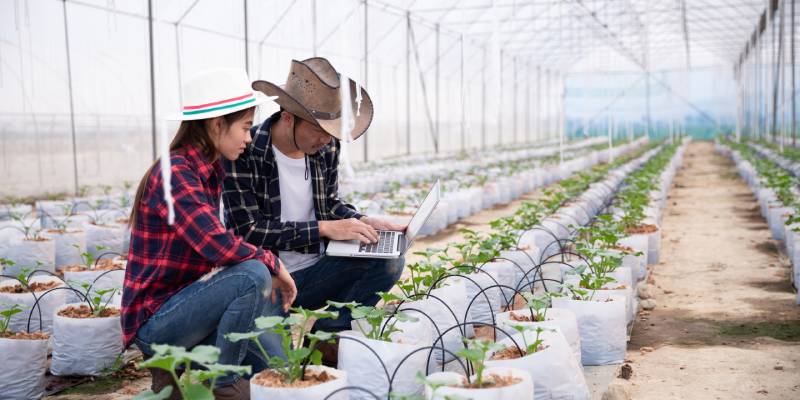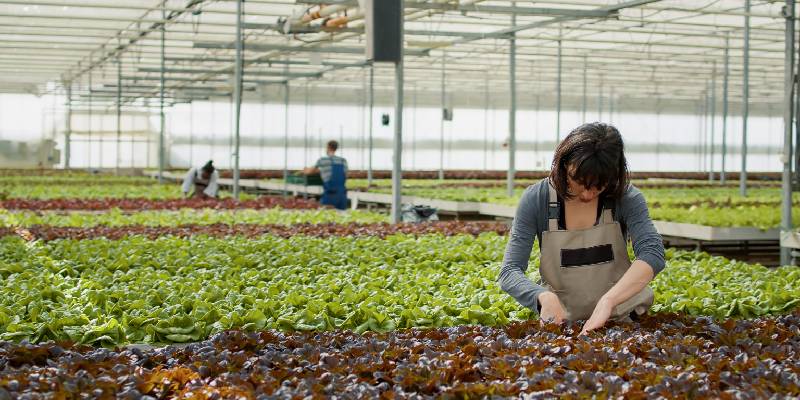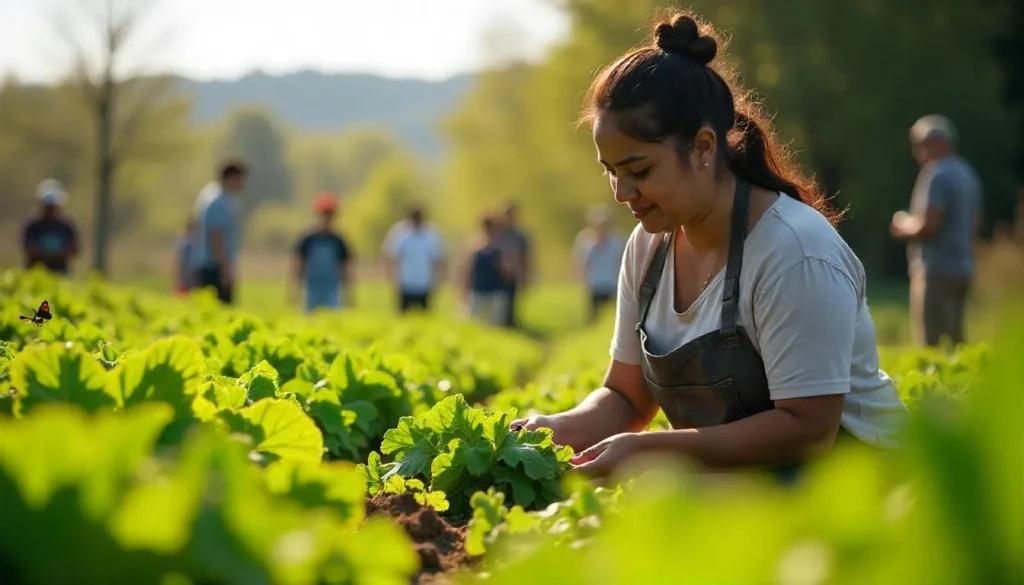Agriculture has long been the backbone of human civilization, but as the global population grows and climate change impacts our world, traditional farming methods are being pushed to their limits. Enter smart farms—a revolutionary approach that combines technology with agriculture to create more efficient, productive, and sustainable farming systems. This blog will explore the concept of smart farms, their benefits, and how they are shaping the future of agriculture, with a focus on how Sanjeevani Farms is leading this transformation as a managed farmland company in Bangalore.
What Are Smart Farms?
Smart farms represent the next step in agricultural evolution. By integrating advanced technologies such as the Internet of Things (IoT), artificial intelligence (AI), and data analytics, smart farms optimize farming processes to achieve higher yields, reduce waste, and minimize environmental impact. This innovative approach to agriculture is a key component of the green economy, aligning with the global push towards sustainability.
Among the technologies available for present-day farmers are:
- Sensors: Real-time monitoring of soil moisture, water levels, light, humidity, temperature, and crop health.
- Software: Specialized tools and IoT platforms for efficient farm management and automation.
- Connectivity: Cellular networks, LoRaWAN, and 5G for reliable data transmission.
- Location Tech: GPS and satellite systems for precise planting, harvesting, and field management.
- Robotics: Autonomous tractors, drones, and robotic harvesters for labor-saving and efficient operations.
- Data Analytics: Platforms that analyze data from various sources to optimize crop management and supply chains.
Key Technologies in Smart Farming
Several cutting-edge technologies are driving the success of smart farms. These innovations are transforming traditional agricultural practices, making them more efficient, sustainable, and productive.
Internet of Things (IoT) in Agriculture
The Internet of Things (IoT) connects various devices and sensors on the farm, enabling real-time data collection and analysis. IoT devices can monitor soil conditions, track weather patterns, and manage irrigation systems, ensuring optimal growing conditions and resource use.
Artificial Intelligence (AI) and Machine Learning
Artificial intelligence (AI) and machine learning algorithms analyze data collected from IoT devices to make informed decisions about crop management. These technologies help predict crop diseases, optimize planting schedules, and even automate tasks such as fertilization and pest control.
Drones and Aerial Imaging
Drones equipped with cameras and sensors provide aerial views of the farm, offering valuable insights into crop health and field conditions. Drones can be used to conduct crop surveys, assess plant health, and detect issues that might not be visible from the ground.
Precision Agriculture
Precision agriculture focuses on applying the right amount of inputs—like water, fertilizers, and pesticides—at the right time and place. This approach ensures that resources are used efficiently, reducing waste and boosting productivity.
Blockchain for Supply Chain Transparency
Blockchain technology offers a secure and transparent way to track the journey of produce from farm to table. It ensures traceability, providing consumers with detailed information about the origin and quality of their food.
Smart Sensors
Smart sensors monitor various environmental factors such as soil moisture, temperature, and nutrient levels. By providing real-time data, these sensors help farmers make timely decisions to optimize crop growth and resource use.
Remote Sensing Technologies
Remote sensing technologies, including satellite imagery and aerial surveys, provide comprehensive data on crop health, soil conditions, and field variability. This information helps in precise management of resources and identification of potential issues.
Benefits of Smart Farms

Smart farms offer numerous advantages that make them a game-changer for the agriculture industry. Here’s how they benefit both farmers and the environment.
Increased Efficiency and Productivity
By automating tasks and optimizing resource use, smart farms significantly boost efficiency and productivity. Sanjeevani Farms has seen substantial increases in crop yields and resource savings thanks to smart farming practices.
Environmental Sustainability
Smart farms reduce the environmental impact of agriculture by minimizing waste, conserving water, and lowering greenhouse gas emissions. Sanjeevani Farms is committed to sustainability, and its smart farming initiatives are central to this mission.
Improved Crop Quality and Yield
With precise control over farming conditions, smart farms can produce higher-quality crops with greater consistency. Sanjeevani Farms’ smart technologies ensure that every plant receives the care it needs to thrive, resulting in superior produce.
Cost Savings
While the initial investment in smart farm technology can be high, the long-term savings in labor, water, and inputs can be substantial. Sanjeevani Farms has experienced significant cost reductions by embracing smart farming.
Better Decision-Making
Access to real-time data empowers farmers to make informed decisions quickly. Sanjeevani Farms uses data-driven insights to respond to challenges swiftly, whether it’s adjusting irrigation during a drought or protecting crops from pests.
Challenges in Implementing Smart Farms
Despite the numerous benefits, the adoption of smart farming technologies comes with its own set of challenges.
High Initial Costs
The cost of implementing smart farm technologies can be prohibitive, especially for small-scale farmers. Sanjeevani Farms has navigated these challenges through strategic investments and partnerships, ensuring that the benefits outweigh the costs.
Technical Expertise
Smart farms require a certain level of technical knowledge to operate effectively. Sanjeevani Farms invests in training and development to ensure that its team is equipped with the skills needed to manage these advanced systems.
Data Security and Privacy Concerns
With the increasing use of digital technologies, data security and privacy are significant concerns. Sanjeevani Farms prioritizes data protection, implementing robust security measures to safeguard sensitive information.
Resistance to Change
Transitioning to smart farming can be daunting, especially for those accustomed to traditional methods. Sanjeevani Farms addresses this by educating and engaging with the farming community, demonstrating the long-term benefits of adopting smart technologies.
The Future of Agriculture with Smart Farms
The future of agriculture is undeniably linked to the continued development and expansion of smart farms. As technology advances, we can expect even more innovative solutions to emerge, further enhancing the sustainability and productivity of farming.
Smart Farms and Climate Change Mitigation
Smart farms play a crucial role in mitigating the impacts of climate change by reducing carbon footprints, optimizing resource use, and promoting sustainable practices. Sanjeevani Farms is at the forefront of this effort, implementing smart farming techniques that contribute to a more resilient agricultural system.
The Role of Policy in Promoting Smart Farms
Government policies and incentives are essential for encouraging the adoption of smart farming technologies. Sanjeevani Farms advocates for supportive policies that enable farmers to access the tools and resources they need to transition to smart farming.
Global Examples of Smart Farming Success
Countries around the world are adopting smart farming practices with great success. From the Netherlands’ high-tech greenhouses to Japan’s automated rice fields, these examples highlight the potential of smart farms to revolutionize agriculture. Sanjeevani Farms draws inspiration from these global initiatives to continuously improve and innovate.
How Smart Farms Contribute to the Green Economy
Smart farms are a vital component of the green economy, offering sustainable solutions that benefit both the environment and the economy. By reducing resource consumption and minimizing environmental impact, smart farms like those at Sanjeevani Farms align with green economic principles, promoting long-term sustainability and resilience.
How Smart Farms Drive Sustainability at Sanjeevani Farms
At Sanjeevani Farms, the integration of smart farming technologies is a key driver of sustainable agriculture, aligning with our commitment to preserving the environment while enhancing agricultural productivity. By adopting smart farming practices, Sanjeevani Farms not only optimizes resource use but also sets a benchmark for environmentally responsible farming.
Here’s how our smart farms are making a difference:
- Optimized Resource Use: We use IoT sensors and AI to manage water, fertilizers, and energy efficiently, reducing waste and conserving resources.
- Enhanced Soil and Biodiversity: Precision agriculture and smart crop management help maintain soil health and support diverse ecosystems.
- Reduced Environmental Impact: Advanced technologies like drones and data analytics minimize the need for pesticides and fertilizers, protecting local environments.
- Increased Economic Viability: By boosting crop yields and quality, our smart farming practices enhance the financial sustainability of our operations.
- Leadership in Sustainability: Sanjeevani Farms sets a high standard for sustainable farming practices, inspiring others to adopt eco-friendly techniques.
Through these smart farming initiatives, Sanjeevani Farms is advancing sustainable agriculture and demonstrating that innovative technology can drive positive environmental impact.
Conclusion
Smart farms are revolutionizing agriculture, offering innovative solutions to some of the most pressing challenges facing the industry today. By embracing advanced technologies, Sanjeevani Farms is leading the way in sustainable farming with premium-managed farmlands, ensuring that agriculture can meet the needs of the present without compromising the future.
If you’re interested in learning more about how smart farms can transform agriculture and how Sanjeevani Farms is pioneering this movement, visit our website. Explore our smart farming initiatives and discover how you can be part of the future of sustainable agriculture.
FAQs
How do smart farms help in conserving water resources?
Smart farms use advanced technologies like IoT sensors and AI to monitor soil moisture levels and weather patterns. This data allows for precise irrigation management, ensuring that crops receive the exact amount of water they need, reducing waste and conserving valuable water resources.
Can smart farms adapt to different types of crops and climates?
Yes, smart farms are highly adaptable. Technologies such as AI and machine learning analyze specific crop and climate data, allowing the farm to optimize conditions for a wide variety of crops whether it’s arid or tropical climates, smart farming techniques can be tailored to suit different environmental conditions.
What role do drones play in pest management on smart farms?
Drones equipped with high-resolution cameras and sensors are used to monitor crop health and detect early signs of pest infestations. They provide real-time data, allowing for targeted and efficient pest control measures that minimize chemical use and environmental impact.
How can small-scale farmers benefit from smart farming technologies?
While the initial investment may be higher, small-scale farmers can benefit from the efficiency and productivity gains provided by smart farming. Technologies like precision agriculture and IoT can reduce input costs and labour while increasing yields. Additionally, cooperative models and government subsidies can help make smart farming more accessible to smaller farms.
Are there any risks associated with relying on AI in smart farming?
While AI offers significant benefits, there are risks such as data dependency and the potential for algorithmic errors. To mitigate these risks, it’s important for smart farms to use AI in conjunction with human expertise, ensuring that technology complements rather than replaces the knowledge of experienced farmers.
How do smart farms contribute to biodiversity?
Smart farms often integrate practices like agroforestry and cover cropping, which enhance biodiversity. By using technology to optimize these practices, smart farms create environments that support a wider variety of plant and animal species, contributing to a healthier ecosystem.
Can smart farms be entirely automated, and if so, what are the implications?
While it’s possible for smart farms to be highly automated, complete automation is rare and may not be ideal. The human element is still crucial for tasks requiring judgment and adaptation to unforeseen circumstances. However, automation can significantly reduce labour costs and increase consistency in farm operations.





